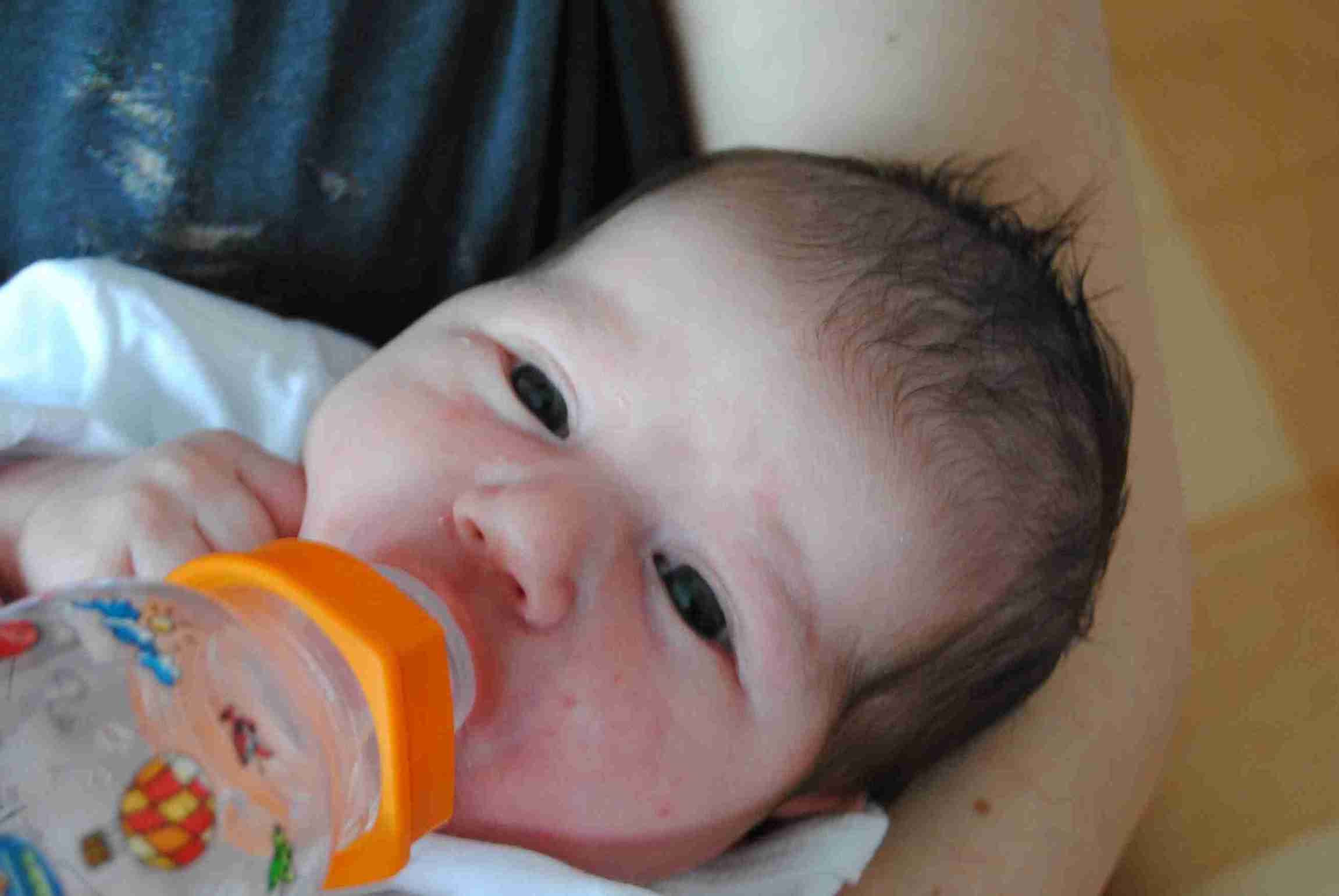
Lactose intolerance occurs when the body is unable to digest lactose, the natural milk and dairy sugar. Although most common in adults and older children, neonatal lactose intolerance can occur, particularly in preterm infants and as a result of temporary situations like acute gastroenteritis.
Frequently, parents confuse lactose intolerance with cow's milk protein allergy. The two are different. Lactose intolerance is a problem with digesting sugar from milk, and cow's milk protein allergy is an immune response to the different proteins in cow's milk. The difference should be known in order to provide the appropriate diagnosis and treatment.

Lactose is a milk sugar present in all mammalian milk, including infant formula and human breast milk. The body uses an enzyme called lactase, secreted in the small intestine, to break it down. When lactase is not present, lactose accumulates in the gut, resulting in cramping symptoms: gas, bloating, and diarrhoea.
Lactose intolerance in newborns is uncommon, occurring in unique circumstances. Infants are usually born with enough lactase to digest their mother's milk, but unique circumstances may lead to a temporary or, in rare situations, a permanent lack of lactase.
There are a variety of different types of infant lactose intolerance:
This is a hereditary condition in which the body naturally slows lactase production after infancy. It's very rare in newborns, with symptoms typically surfacing after weaning.
Most common in infants, this involves an illness, like gastroenteritis, that destroys the lining of the small intestine where lactase is made. This form is typically short-lived and corrects itself once the gut heals.
A rare inborn error of metabolism, in which infants are born with minimal to no capacity for lactase production. Symptoms develop shortly after birth, even during breastfeeding, and are usually severe.
Develops in premature infants whose digestive system has not fully developed yet. This is also transient, and as the infant grows up, lactase production usually happens.
Knowing the particular type of infant lactose intolerance directs treatment, particularly in determining whether to continue breast milk or switch to a different formula.

Knowing newborn lactose intolerance symptoms can allow parents to obtain early treatment.
The most prevalent symptoms are:
● Excessive bloating and gas
● Diarrhoea or frothy, watery stools
● Abdominal cramping or pain (baby may curl up legs to belly)
● Fussiness or irritability after feeding
● Redness or rash near the anus caused by acidic stool
● Excessive crying during or after feeding
● Failure to gain weight or grow
● Rare vomiting
These newborn symptoms of lactose intolerance can overlap with other illnesses, such as colic or food allergy. Therefore, it is important for a paediatrician to evaluate the child and make an accurate diagnosis.
If lactose intolerance is thought to be present, a physician will perform a thorough review of symptoms and medical history. Diagnostic measures may include:
● Elimination Trial: Avoiding lactose in the diet for a time and looking for relief of symptoms.
● Stool Acidity Test: Undigested lactose creates acid in the stool, a familiar test in infants.
● Hydrogen Breath Test: Infrequently performed in very young infants, but it quantifies hydrogen generated by undigested lactose.
● Skin Prick or Allergy Test: Assists in eliminating cow's milk protein allergy, which is managed differently.
Diagnosis confirmation prevents unnecessary dietary restriction in babies by ensuring they receive appropriate treatment for lactose intolerance.

It depends on the severity and type of lactose intolerance. The majority of cases, particularly secondary or developmental, are transient and improve with time.
● Change to a lactose-free or low-lactose infant formula according to the paediatrician's recommendation.
● Avoid using soy or nut-based formulas unless absolutely medically necessary.
Breastfeeding can be continued in most cases. Lactose is found in breast milk, but overall, it's alright.
● Doctors may recommend lactase enzyme drops to help the baby digest.
● Monitor symptoms and improvement to ensure the baby is fine.
● Treat the underlying condition, e.g., a bacterial infection of the gut. As advised by a pediatrician.
● Ensure the baby is well-hydrated.
● Monitor for improvement or deterioration of symptoms.
Always have a discussion with your paediatrician before making any adjustments to feeding. Self-diagnosis and changing your baby's diet on your own can result in nutritional deficits or poor weight gain.
Proper treatment of infants' lactose intolerance targets not just alleviating the symptoms but also promoting healthy growth and development.
You should visit your paediatrician if your baby:
● Has chronic diarrhoea
● Is fussy or uncomfortable during feeding
● Is showing signs of dehydration: dry mouth, sunken eyes, or reduced urination
Early treatment makes a big difference in recovery as well as the prevention of complications.
Cloudnine has emerged as a leader in neonatal and infant care, offering services guided by experts with individualised care at every stage of a baby's development. The distinctness of Cloudnine lies in its promise of marrying state-of-the-art medical technology with a personal, compassionate solution. Anchored on a specialised team of neonatologists, paediatricians, and lactation consultants, Cloudnine offers well-rounded care for feeding issues, gut health, and baby health. From safe testing to gentle, evidence-based treatment plans, Cloudnine emphasises safety, comfort, and evidence-based care for both parents and babies.

While lactose intolerance is rare in newborns, awareness of the symptoms ensures that they are treated early and managed. Most conditions in infants, especially those due to infection or premature birth, are temporary and self-resolve with advancing age. Newborn lactose intolerance symptoms of diarrhoea, gas, and irritability require medical attention for proper diagnosis.
With the right testing and the proper guidance, lactose intolerance in infants treatment can be straightforward and successful. Don't worry, and let your paediatrician walk you through the best solution. Ultimately, ensuring your baby's comfort, growth, and nutrition always comes first.

It could be green, watery, and frothy, possibly with acidic material, which may produce redness around the anus.

If on formula, it is generally advised to use a lactose-free formula. If breastfed, it may be permissible to continue breastfeeding under medical guidance with the use of lactase enzyme drops.

Yes, breast milk does have a high content of lactose, but breast feeding can be continued in such babies as advised by the pediatrician. If any danger signs noted, advised to meet pedatrician for further adjustments in the nutrition.

No. Generally, breast milk has a higher content of lactose than most infant formulas. Yet, formulas are available that are lactose-free or low in lactose.